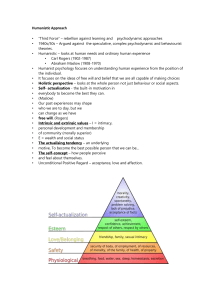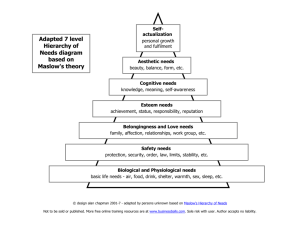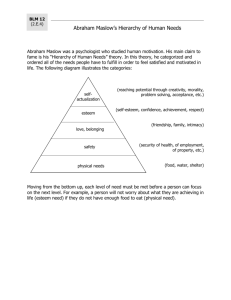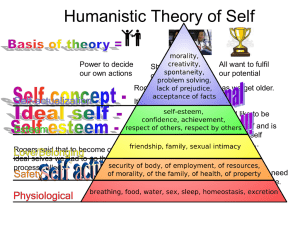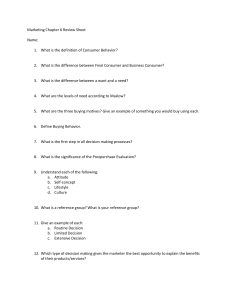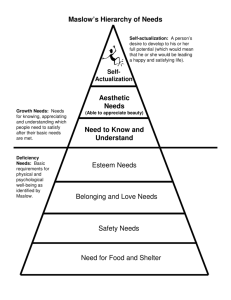The Humanistic Approach
advertisement
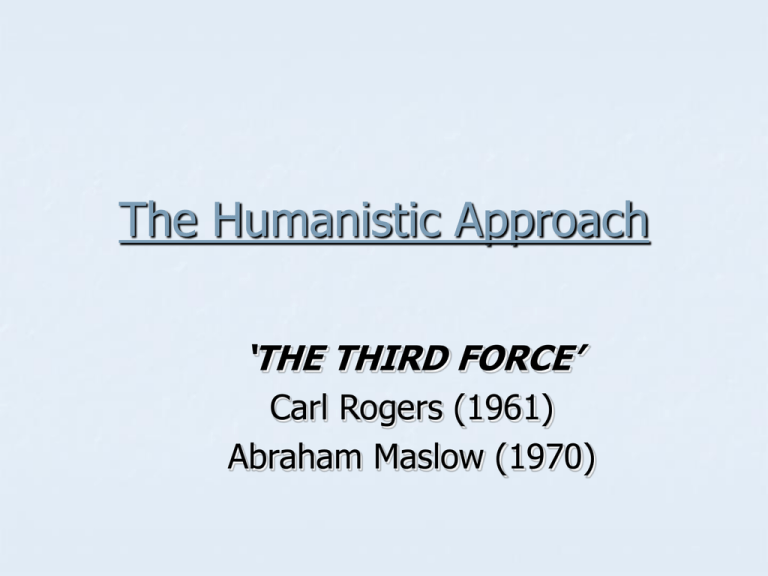
The Humanistic Approach ‘THE THIRD FORCE’ Carl Rogers (1961) Abraham Maslow (1970) Basic assumptions The approach assumes that every person is unique and that psychology should focus on the subjective feelings and thoughts of the person. This is described as an ideographic approach. The focus is on each individual, not whole populations. All people have free will, and that their behaviour is not determined by unconscious forces (psychodynamic) or stimulus-response sequences (behaviourism). People must be viewed from a holistic point of view. Instead of reducing behaviour and thought to smaller elements the focus should be the whole person. Assumptions Continued People are essentially good and will grow psychologically if given positive regard at all times. People strive to realise their full potential in life – called self actualisation People are motivated by a hierarchy of needs, with basic needs at the bottom of the hierarchy and self-actualisation needs at the top. Psychological therapies should be clientcentred and involve warmth, empathy and genuineness. Psychological problems are due to a difference between a person’s perceived self and their ideal self. The scientific method is not appropriate to help our understanding of people. The focus must be on subjective experience, known by the term phenomenology, which is to do with a person’s own experience of the here and now. The self and self-concept are fundamental, and conscious report is all that counts. Free Will Humanists believe that every person has active agency, this means they are able to change and decide on their own development. People can change their actions and the environment in which they live. This means that people are responsible for their own actions and for their own personal growth. Client Centred Therapy In terms of this, people are encouraged to understand how free will may be constrained. People cannot go around doing whatever they want all the time. What other people want, the morals and the laws of society, and family values, for example, may all constrain free will. In order to function properly in society, the person has to understand these constraints and learn to live with them. Self and Self Actualisation Self Self Concept Ideal self vs Actual self Unconditional positive regard Carl Rogers (1980) The concept of self develops and emerges during childhood. The child develops an awareness of the self and ‘I’ or ‘me’ experiences. As the child grows older they become aware of their own identity, personality characteristics, likes and dislikes, and so on. The self includes all aspects of personal experience and a sense of ‘being’. Through the feeling of the self develops the self-concept. The most important part of this being the ideal self. If there is a significant difference between these two elements then a state of discomfort or incongruence is said to exist. It is the aim of Humanistic Psychotherapy to lessen this difference and bring about a state of congruence. Self - Actualisation Both Rogers and Maslow believed that every person has an innate tendency to realise their full potential, or self-actualise. This may be achieved in different ways by different people. Some may achieve it through religious devotion, others through cooking, and others through writing poetry. Hierarchy of Needs As each need is satisfied, the person may go up the hierarchy and attempt to satisfy the next need. People who suffer extreme poverty or privation may spend all their time trying to satisfy the basic physiological and safety needs, and may never achieve the higher needs. Hierarchy explained The first four needs are deficiency needs (trying to make or achieve what is essential to live), while the fifth need, selfactualisation, is a growth need. Maslow said there are 3 main preconditions for a person to be able to self actualise: No restraints imposed by others on what you can do; Little or no distraction from deficiency needs; An ability to know yourself very well. Key characteristics of people who self-actualise (Maslow 1970) Accurate perceptions of the world; Acceptance of other people; Creative; Good sense of humour; Detached and needing privacy. Maslow described the experience of selfactualisation as having a ‘peak experience’. Some may regard self-actualisation as a deeply religious experience or mythical experience that is of great significance in their life. Moments of self-actualisation do not often occur in life and some people may never achieve this.
